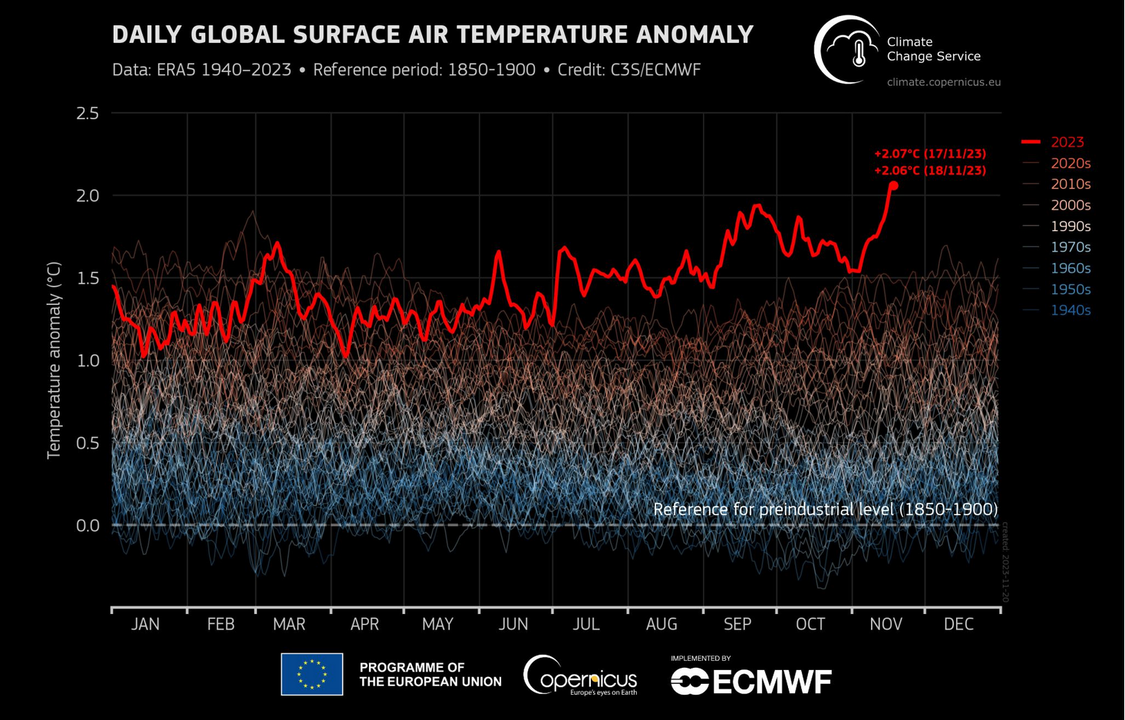
2023: Climate Shocker - Record-Breaking Heat Leaves Scientists Puzzled
Share
-
2023 witnessed record-breaking heat and extreme weather events, exceeding even the most dire predictions.
-
The cause of these extremes remains partially unexplained, with scientists investigating factors beyond conventional climate models.
-
The close proximity to the 1.5°C warming threshold set by the Paris Agreement underlines the urgency of climate action.
2023 wasn't just hot, it was a climate curveball that left even seasoned scientists reeling. While predictions anticipated a record-breaking year, the reality far surpassed expectations, triggering unprecedented droughts, floods, storms, and wildfires across the globe. The question now hangs heavy: what went wrong?
Even leading climatologists like NASA's Gavin Schmidt were left flabbergasted. "Frankly astonished," he described his reaction. It wasn't simply a heat record shattered; it was, as Schmidt put it, "a record that broke the previous record by a record margin."

While global warming remains the undeniable driving force, something unexpected threw gasoline on the fire. "What happened in 2023 was that, and then plus something," Schmidt explains. This mysterious "plus something" is currently baffling researchers, with potential culprits ranging from aerosols and El Niño to Antarctic ice melt and Earth's energy imbalance.
For the first time ever, every single day of 2023 saw temperatures exceeding 1°C above pre-industrial levels. This unnervingly close proximity to the 1.5°C warming threshold set by the Paris Agreement casts a dark shadow over global climate goals.
Adding to the confusion, ten climate prediction centres in 2022 gave the extreme temperatures witnessed in 2023 a very low probability. El Niño, a known contributor to climate fluctuations, also behaved unexpectedly, suggesting external factors were at play.
One such factor could be the dramatic decline of Antarctic sea ice, which hit its lowest point in 45 years. Scientists have never seen the southernmost continent melt at such a pace, throwing existing climate models into disarray.
"It's five standard deviations beyond the mean," explains physical oceanographer Edward Doddridge. "This means we'd expect to see such a winter once every 7.5 million years under normal conditions."
The potential consequences of widespread Antarctic melting are terrifying. Scientists worry it could trigger a positive feedback loop, making the ice sheet even more vulnerable and accelerating its demise.
From volcanic eruptions and shifting aerosol patterns to the solar cycle's influence, researchers leave no stone unturned in their quest to understand the 2023 anomaly.
The big question hanging in the air: was 2023 an outlier or a chilling glimpse into a future of accelerated climate change? "It matters why 2023 was the way it was," says Schmidt, "because does that mean it's going to continue? Does that mean the impacts are going to start to accelerate? We don't know! And that's problematic."
Earth scientist Robert Rohde from Berkeley University sums it up grimly: "With greenhouse gas emissions continuing to set record highs, it is likely that the climate will regularly exceed 1.5°C in the near future."
In 2023, climate change served as a terrifying wake-up call. While scientists frantically work to unlock the mysteries behind last year's extremes, one thing is clear: buckle up. The future of our planet hangs in the balance, and understanding the complexities of our changing climate is more crucial than ever.
You’ve come this far…
Why not venture a little further into A.S.S. - our exclusive Australian Space Society.
And keep thrusting Australia into the deep unknown…
#Space_Aus





